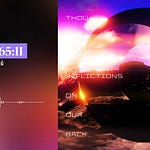Take not away my soul, O God, with the wicked: nor my life with bloody men: (Psalm 25:9 DR)
In the midst of his exile among the pagans, the Psalmist is between the proverbial rock and a hard place. On the one hand he is forced to dwell in the midst of overt idolatry, which weighed heavily upon his conscience, for even though he was innocent of wrongdoing it is still troublesome to the spirit to be surrounded by wickedness. But on the other hand all that awaits him in his homeland is death at the hand of the sword.
These two realities come rushing back to mind, as it were. For having in the previous passage just declared his desire and love for the house of the Lord, he is now brought out of ecstasy to remember his reality and the trouble which surrounds him on every side.
Of all the sins of his people in their history, idolatry was perhaps the most justly and swiftly punished, idolatry being at root an unfaithfulness to God. The Psalmist elsewhere gives voice to the faithlessness of God’s people and the punishment they endured for their idolatry:
They made also a calf in Horeb: and they adored the graven thing. And they changed their glory into the likeness of a calf that eateth grass. They forgot God, who saved them, who had done great things in Egypt, Wondrous works in the land of Cham: terrible things in the Red Sea.
They also were initiated to Beelphegor: and ate the sacrifices of the dead. And they provoked him with their inventions: and destruction was multiplied among them.
And the Lord was exceedingly angry with his people: and he abhorred his inheritance. And he delivered them into the hands of the nations: and they that hated them had dominion over them. (Psalm 105:19-22, 28-29, 40-41)
This would have been embedded into the Psalmist’s mind from a young age, this litany of adultery in which the Lord’s people had engaged despite His loving-kindness towards them. Being now surrounded by this same idolatry in a foreign land, the Psalmist no doubt worries that destruction is at hand, that he might be swept away with the wicked when God pronounces His just judgment on them.
After all, prior to his exile David been the hand of God’s judgment against the very people among whom he now dwells, and this success that the Lord gave him was partially responsible for King Saul’s envy of him and thus his exile in a foreign land among his enemies. To survive he was forced to serve as a mercenary for his enemies, although in often clandestine ways. Yet perhaps he sensed that it was only a matter of time until the wrath of God was poured out upon them by the hand of another, and he might be swept away in that judgment.
His love for the house of the Lord and the beauty thereof thus stands in sharp contrast to the former idolatry and adultery of his people. They were led astray into serving false gods and thus abandoned the Lord God, but he in his innocence has remained faithful and still desires to dwell in the house of the Lord.
As he asks to not have his soul taken away with the wicked, he thus prays for a deliverance that he cannot currently see, a rescue from an untenable circumstance from which there is no earthly solution.
The “bloody men” on the literal level are those who seek after his life, his own king and countrymen who seek to put him to death as a traitor and usurper. These bloody men are also men of his own blood, which lends a level of dark irony to the matter. But on the spiritual level the bloody men are the corollary of the idolatrous, for while the idolatrous reject the love of God, the bloody men reject the love of their neighbor:
Destroy not my soul with the ungodly. Destroy not then, together with them that hate You, my soul, which has loved the beauty of Your house. And my life with the men of blood. And with them that hate their neighbour. For Your house is beautified with the two commandments. (St. Augustine, Expositions on the Psalms, 25, 9.)
These two commandments are of course those of which our Lord speaks in the Gospels:
Thou shalt love the Lord thy God with thy whole heart, and with thy whole soul, and with thy whole mind. This is the greatest and the first commandment. And the second is like to this: Thou shalt love thy neighbour as thyself. On these two commandments dependeth the whole law and the prophets. (Matthew 22:37-40 DR)
Idolatry rejects the love of God by loving something else in preference to God, whereas hatred of one’s fellow man rejects the love of neighbor which flows forth from the charity of God. Thus, these two commandments are, as it were, a package deal, for if one does not love one’s neighbor—which is the result of the charity of God in the soul—one cannot love God:
We know that we have passed from death to life, because we love the brethren. He that loveth not, abideth in death. Whosoever hateth his brother is a murderer. And you know that no murderer hath eternal life abiding in himself. In this we have known the charity of God, because he hath laid down his life for us: and we ought to lay down our lives for the brethren. He that hath the substance of this world, and shall see his brother in need, and shall shut up his bowels from him: how doth the charity of God abide in him? (1 John 3:14-17 DR)
These two commandments, St. Augustine notes, are the adornment of the house of the Lord, that which makes it beautiful. Without this charity there can be no beauty, and all that is left are wicked and bloody men who serve as an inverse of these two commandments:
Take not away my soul together with the wicked: nor my life with bloody men. He justly asks that his soul should not perish with the wicked at the judgment to come, for he has not joined in action with them. He deservedly sought to be separated there from the persons from whom he separated himself here; for bloody men are those who live according to the flesh, and who long for no commands from heaven. So such men are dispatched to death from the Jerusalem to come, for they are to be condemned because of their wickedness. (Cassiodorus, Explanation of the Psalms, 25, 9, Ancient Christian Writers.)
The Psalmist’s plea for mercy may be couched in the sense of a request or plea, but in reality it is made in full confidence of God’s justice. The Psalmist has maintained his integrity and innocence by not participating in wickedness, but even further has loved the beauty of the house of the Lord, by which he means having fulfilled the commandments of charity towards God and his neighbor.
Even in the midst of such great peril, and the troubling of his conscience among wicked and idolatrous men, he still has faith and hope in his eventual vindication. For even though he cannot of his own wits see a way out that he might escape the wrath to come, yet he has confidence in God’s mercy and justice, in the One Who will reward him for his faithfulness:
My little children, let us not love in word, nor in tongue, but in deed, and in truth. In this we know that we are of the truth: and in his sight shall persuade our hearts. For if our heart reprehend us, God is greater than our heart, and knoweth all things. Dearly beloved, if our heart do not reprehend us, we have confidence towards God: And whatsoever we shall ask, we shall receive of him: because we keep his commandments, and do those things which are pleasing in his sight. (1 John 3:18-22 DR)
For this animation I found a photo of this guy falling and deciding to make it look like his soul was being extracted. You know, because that’s easy to convey. Anyway, I isolated the image in Photoshop and then precomped it. I duplicated that precomp and used a texture with the guy as a matte for the texture.
Back in the main comp I applied Stretch to it and isolated the effect to his abdominal region, to give the sense of something being taken away. I then placed a texture in the background and also applied Stretch to it to provide the sense of movement.
I finally added in some lightly animated text and color correction to finish this out.
Enjoy.
Take not away my soul, O God, with the wicked: nor my life with bloody men:
(Psalm 25:9 DR)
View a higher quality version of this gif here:













Share this post